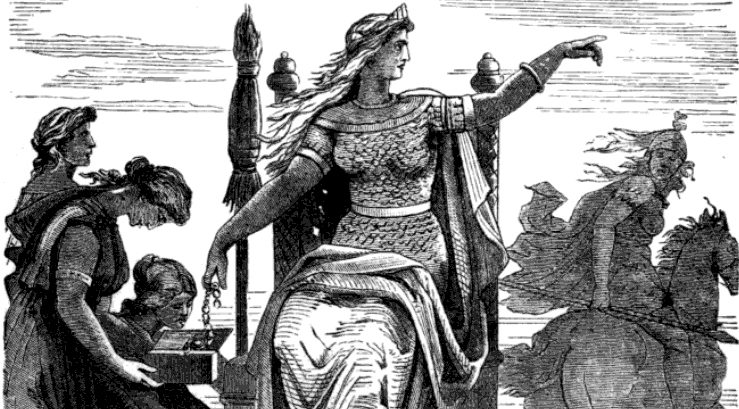The Basis of Divinity
There seems to be a great deal of confusion, misunderstanding, and even hostility regarding our gods and their divinity. Their roles, responsibilities, origins, even their very existence, is often questioned and debated with varying degrees of scholarship and civility in modern Heathenry. Much of the time, the simple fact of the matter is that many Heathens have a very poor understanding of the gods they claim to worship. Worse, they ascribe divinity to beings that are anything but divine.
This article, like all those in our series of articles posted on Real Heathenry, is not meant to be taken as a scholarly work on the subject. Nor is it intended to be presented as a definitive, unbiased, and unassailable secondary source. It is at its heart an opinion piece, the work of a few Heathens with some understanding of the subject matter and a desire to share their views with you, the public. Thus, reader beware! Some of what we say may very well anger you. That’s entirely your purview, not ours.
Throughout the sagas, songs, poetry, and art of the ancient Germanic tribes are wonderful tales of the fantastical beings that inhabit the world around us. Many of these beings exhibit godlike powers, exert influence over the world in godlike ways, and are offered sacrifice by their human adherents. They are, rightly, called ‘gods’. But within the stories are tales of OTHER beings, who also possess the same powers, knowledge, wisdom, and influence. Why, then, are these beings NOT called gods and thus do not receive sacrifice? A perplexing question, but one that becomes quickly and easily answerable when one considers things as much as possible from an arch-Heathen worldview.
The tribe is the center of all Heathen thought (or should be). As has been detailed quite extensively, both on this page as well as numerous other places, the Heathen tribal unit (the family and close blood kin as well as close friends) is what both binds and strengthens the individual. As such, all that the individual does should be with an eye towards propelling the family forward, enhancing its luck and fortunes for future generations. It is this belief that underscores the definition of godliness.
Simply put, a god is a powerful, unseen being, possessing all the godly attributes and powers you would expect, whose actions are of benefit to their tribe. They do things not for selfish reasons (or not purely), but because their actions will have a positive impact upon their inner-yard. Sometimes those actions may be considered ‘dishonorable’ by mere humans, even if we benefit from the act. Odin’s theft of the mead of poetry is often trotted out as an example of this. But, and here is where many modern Heathens have difficulty, Odin’s actions were in no way dishonorable towards his own tribe. He tricked his enemies to the betterment of his own people. This was the very definition of an honorable act, especially in that he managed to do so without spilling any blood himself (the nine slaves killed each other off, he merely offered to sell them a whetstone).
The giants, on the other hand, while possessing great power and wisdom, act purely out of selfish motive. At most, their beneficence extends to their immediate family (and not even that far, much of the time). They have no tribe, no inner-yard, no web of gifting and reciprocity. They rule their territories by fear and might alone. While some individuals may exhibit ‘honorable’ tendencies, or even be considered at least neutral towards the tribes of gods, because they do not further their tribal strength they are not counted as gods.
Basically, and as succinctly as possible: Gods act to the benefit of their tribe. Giants either act purely from selfish motive, or simply do not have any tribe at all.
This, of course, explains how giants may come to be counted among the gods. Skadhi was adopted into the tribe, and through her right actions and strengthening of her bonds, continues to be counted a god. This is why Loki can no longer be considered a god. He was ejected from the tribe after numerous crimes committed against his own kin, up to the final kin-slaying which led to his exile. He still possesses all his godly powers (or would, were he not bound to a rock) and knowledge, but due to his discommendation he is no longer part of the tribe and thus not a god; he is merely “godlike.”
There may also be local, tribal, and traveling gods and humans with godlike powers after death. It is known that sacrifice was given to particularly potent or successful lords and chieftains throughout Europe, in the belief that they could still exert beneficial influence over their district from their grave-howe. But these are matters which deserve their own examination and will be covered in future articles.
